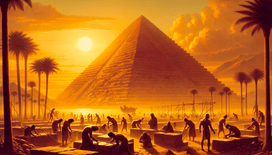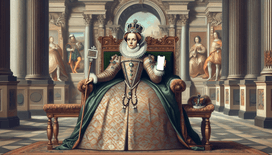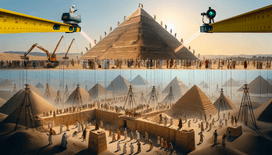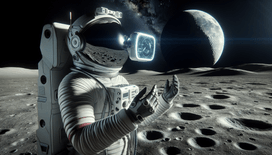Ah, the Industrial Revolution! That bustling, brawling epoch when men sported top hats and women heroically navigated the clunking gears of progress in crinolines. When steam engines puffed their way into history and Dickensian factories made child labour a grim reality. But what if... what if the factories of that era were not powered solely by steam and coal but by artificial intelligence? That’s right, friends – welcome to the Age of Machine Learning Lunacy!
Picture the scene. It’s a chilly morning in Manchester, circa 1850, the air thick with the soot of ambition and locomotives. Inside a sprawling brick structure, the churning sounds of pistons and grinders are underscored by the occasional clatter of a mechanised loom. But wait – what’s this? A glowing panel, eerily futuristic, juts incongruously from the wall. Yes indeed, Victorian textile industry, meet your newest employee: A.I. the Artificial Intellect. And it’s not even demanding an hourly wage.
The Loom With Room for Improvement
The grand dame of the textile factory, the Jacquard loom, which transformed things with its punch cards, is observing a transformation of its own. Our AI comes packaged with its own set of algorithms and even performs nifty calculations faster than one could say "Bob’s your uncle." Instead of punch cards, it’s now layers of neural networks dictating the patterning process. Goodbye, gorgeous but fiddly cards! Hello, seamless fabric runs that would make a Time Lord pirouette in admiration. The precision, the variety, and let’s face it, no more poorly tied knots. The factory floor is abuzz – as much with electric anticipation as with the whir of automated looms eliminating human error (and soup stains).
Not-So-Great Expectations
Meanwhile, in the world of literature, Charles Dickens finds himself muscling in on the factory visit, notebook in hand. Word has it that Dickens plans to immortalise this magnificent tapestry of soot and silicon. Alas, even Dickens, ever the champion of the underdog, finds himself challenged by AI’s lack of human spirit. "Where is the fiery grit? The plight of the proles? The blood, sweat, and tears of the convenient plot point?" he muses aloud, as his pen scratches defiantly over a fresh page, all the while pondering if AI can feasibly be interwoven into the fabric of a novel.
AI: Ally or Nemesis?
The factory owners, naturally, are delighted. Efficiency skyrockets, output quadruples, fortunes swell like the Thames after a rainy fortnight. Workers have mixed feelings: some cheer for reduced toil, others worry about redundancy. Let’s not forget the trades unions. Would they take to the mill owners’ chain with a virtual crowbar if AI renders their bargaining power moot? Shouting slogans like "Solidarity with Silicon!" could become rather awkward, especially when the said silicon is doing a stellar job supervising tea intervals. Still, AI does bring in certain undeniable perks – health and safety violations are a thing of the past, spare the occasional glitch-induced pirouette!
Industrial Revolution 2.0
As the Industrial Revolution 2.0 continues to rev up, scientists from the Royal Institution, characters marginally less eccentric than famed physicists yet equally absorbed, debate the grand question: Will the appendage of AI prompt the gold-tipped top hats of industry to tip rather far? Some worry it could create a machine-fueled feudalism, where people exist merely to push algorithmic buttons. Others dream of a world where AI’s cold logic adapts a soft-padding, compassionate programming, replacing not merely tasks but menial jobs entirely with a globe-spanning industrial utopia. One where button-pushing is hand-in-hand with button-matching – at long last, the correct buttons on one’s waistcoat fastened with sartorial perfection.
Innovations crafted by human hands, shaped by human curiosity and fallibility, could potentially take on new trajectories. But be assured, gentle readers, no amount of A.I. could replicate the human capacity for whimsy, storytelling, and artistic fancy contained in relaying ‘What if?’ scenarios. After all, a world set by AI might make history efficient, but it certainly wouldn’t make it half as entertaining as when told by this humble raconteur.







